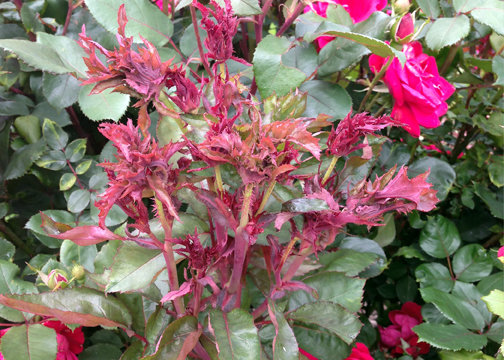Disease affecting Kentucky roses
Disease affecting Kentucky roses

Roses are popular garden plants because of their beauty and pleasant aroma, but a new disease is affecting roses and threatening to change the landscape of many Kentucky gardens, said Nicole Ward Gauthier, extension plant pathologist with the University of Kentucky College of Agriculture.
“Rose rosette virus is affecting all types of roses, including Knock Outs, which are known for their exceptional disease resistance and hardiness,” she said. “Due to the high demand for Knock Out roses, mass production has led to the accelerated spread of diseased roses throughout the industry.”
Rose rosette disease first appeared on Kentucky Knock Outs in 2009. It is caused by a virus that is transferred to healthy plants during grafting or is carried by the microscopic rose leaf curl mite. These mites on an infected plant can move to adjacent roses or can travel farther by wind currents. Due to their size, it is nearly impossible to get good coverage with a miticide, so miticides are not recommended, Gauthier said.
Disease symptoms include shoot elongation, abnormal red coloring of shoots and leaves, exceptional thorniness, distorted or aborted flowers and a cluster of small shoots called a witches' broom. Symptoms begin to appear in the spring and intensify as the season progresses.
“These symptoms look like herbicide damage. In order to successfully identify the virus, we have to know the history of herbicide usage on and around the plants,” Gauthier said. “If a plant has herbicide damage, symptoms will usually appear in a larger area. Rose rosette disease may only first appear on one cane or a couple of canes scattered throughout a plant.”
If a plant is infected with rose rosette virus, it can become more susceptible to other diseases and become less winter-hardy.
If plants are determined to have rose rosette, they should be removed, as viruses are not curable. While only a portion of a plant may exhibit symptoms, the virus infects the entire plant. Therefore, pruning affected canes will not save or cure virus-infected plants. Homeowners and nursery growers also should avoid replanting another rose in the same area because, while the virus cannot survive in soil, it can survive on any infected root fragments left in the ground.
Individuals can reduce risk of spreading rose rosette virus by knowing its symptoms and carefully inspecting all roses in the nursery or garden center before purchase.
“If growers have an established rose garden, they should be very cautious when bringing any new plants in,” Gauthier said.
Gauthier has created a rose rosette disease fact sheet for individuals wanting more information. It is available online at http://www.ca.uky.edu/agcollege/plantpathology/ext_files/PPFShtml/PPFS-OR-W-16.pdf or through local offices of the UK Cooperative Extension Service.
Extension Horticulture

